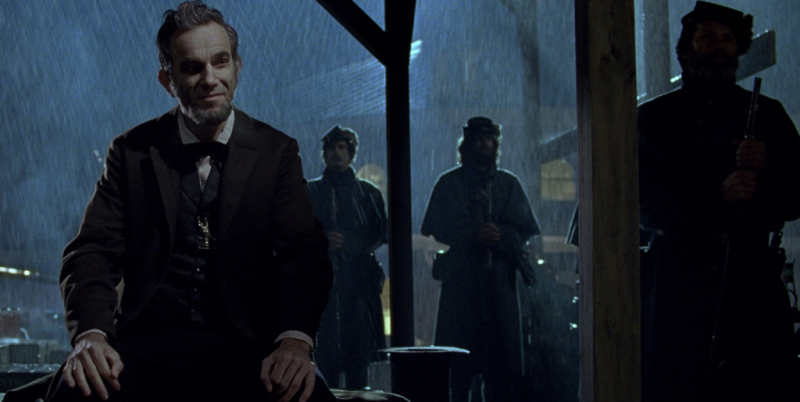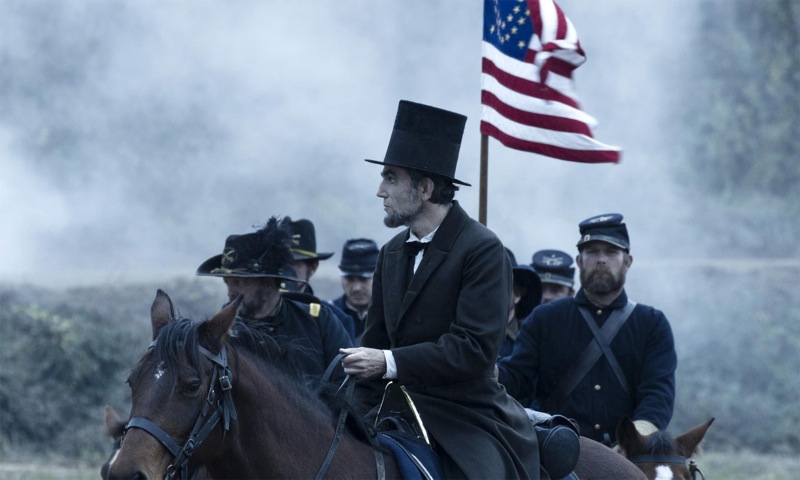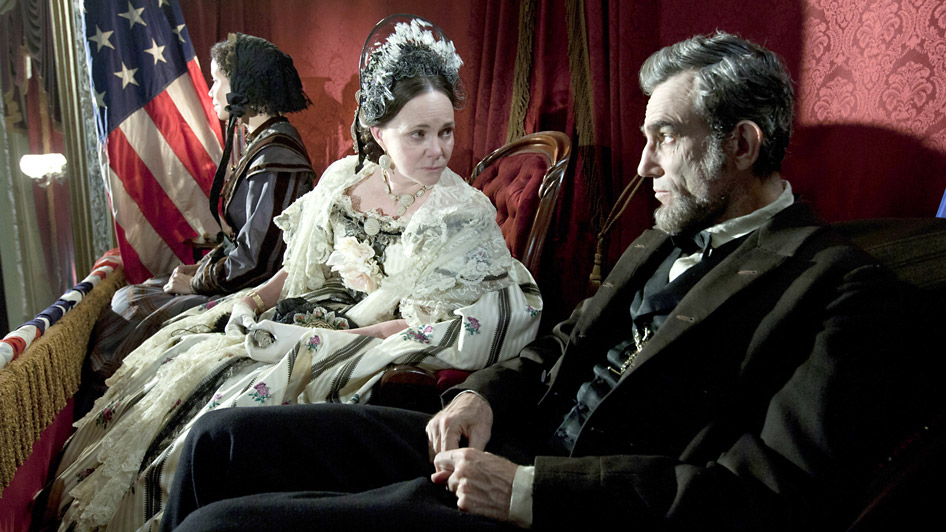Lincoln | reviews, news & interviews
Lincoln
Lincoln
Spielberg's intelligent and stirring biopic suggests that Honest Abe wasn't averse to a few dirty tricks

A rum aspect of the Oscar nominations has been the inclusion of two films that concern American slavery, and which could not be more different: in Django Unchained, Quentin Tarantino gives the American slave exactly the sort of empowerment he offered the Jews in Inglourious Basterds – blood-splatter violent and fantastical; in Lincoln, Steven Spielberg is happy to lean on the history books, for a respectful biopic.
Spielberg is no stranger to the subject, of course, having made The Colour Purple and Amistad. This is far superior to both of those films, founded as it is upon an exceptional screenplay, and another phenomenal performance by Daniel Day Lewis. It also feels like a perfect film for the times: the US box office successes of both Lincoln and Zero Dark Thirty are indicative of a period in which Americans are much more reflective and self-critical than is customary; aside from its homage to the country’s most revered president, Spielberg’s film is a reminder of the enduring battle between American idealism and bigotry, and between its White House and Congress.
 Tony Kushner’s intelligent, wonderfully wordy screenplay draws most notably on Team of Rivals: The Political Genius of Abraham Lincoln, by the historian Doris Kearns Goodwin. Goodwin charted four years of the Lincoln presidency, and the skill with which he united politicians from different factions behind his attempt to abolish slavery. Kushner uses an even closer focus, considering just the single month leading to the passing of the 13th amendment, somehow through this narrow window revealing Lincoln’s entire biography and the essence of his character – the reasons why Americans then and now revere him. As biopic it is unusually well conceived.
Tony Kushner’s intelligent, wonderfully wordy screenplay draws most notably on Team of Rivals: The Political Genius of Abraham Lincoln, by the historian Doris Kearns Goodwin. Goodwin charted four years of the Lincoln presidency, and the skill with which he united politicians from different factions behind his attempt to abolish slavery. Kushner uses an even closer focus, considering just the single month leading to the passing of the 13th amendment, somehow through this narrow window revealing Lincoln’s entire biography and the essence of his character – the reasons why Americans then and now revere him. As biopic it is unusually well conceived.
That month is January 1865. The civil war is almost won, but Lincoln (Daniel Day Lewis) is far from content. He knows that victory will not be enough to defeat slavery, that abolition needs to be enshrined in law, but if the war ends first politicians will feel no need or desire to pass such a law. And so a man who apparently did everything slowly now feels the need to rush, as he embarks on an intense period of lobbying – using compromise, manoeuvre and skulduggery to bring the house of representatives behind abolition.
 Spielberg offers a couple of gory glimpses of the battlefield, to remind us of the terrible cost of the civil war, and of the moral conundrum of Lincoln’s tactics, which involve delaying a peace treaty until his amendment is passed. But most of the film takes place in the drawing rooms and debating chambers of Washington, where we watch Lincoln at work as a very pragmatic political animal. There’s something of The West Wing in the behind-the-scenes detailing of the film, the banter and tactics, constant reference to constitution and law, haggling for votes, the film sharing the TV series’ humour and its refusal to patronise its audience. We also get a sober glimpse of the president’s family life, with his emotionally unstable wife (Sally Field, pictured above with Day Lewis), his youngest son, and his eldest (Joseph Gordon Levitt) who is keen to join the war despite his parents’ wishes.
Spielberg offers a couple of gory glimpses of the battlefield, to remind us of the terrible cost of the civil war, and of the moral conundrum of Lincoln’s tactics, which involve delaying a peace treaty until his amendment is passed. But most of the film takes place in the drawing rooms and debating chambers of Washington, where we watch Lincoln at work as a very pragmatic political animal. There’s something of The West Wing in the behind-the-scenes detailing of the film, the banter and tactics, constant reference to constitution and law, haggling for votes, the film sharing the TV series’ humour and its refusal to patronise its audience. We also get a sober glimpse of the president’s family life, with his emotionally unstable wife (Sally Field, pictured above with Day Lewis), his youngest son, and his eldest (Joseph Gordon Levitt) who is keen to join the war despite his parents’ wishes.
The pain of the nation’s crisis is etched deeply into Day Lewis’s ashen face, and sometimes reduces his voice to a sombre whine. In another remarkable performance, his Lincoln is weighed down by melancholy, yet at the same time is charming and funny (Lincoln’s famed penchant for folksy, yet pointed anecdotes is amusingly evoked) and fiercely determined. The explosions of frustration are quite something, whether he’s riling at the “talentless hicks and hacks” who block his legislation (a phrase that will have tweaked Obama’s attention), or reminding his cabinet that “Blood's been spilled to afford us this moment. Now! Now! Now!”
The star is surrounded by a corking cast, which includes James Spader as a roguish lobbyist doing the president's dirty work in buying votes, David Strathairn as secretary of state William H Seward (one of that team of rivals) and Jared Harris as Ulysses S Grant; Tommy Lee Jones (pictured below) is a typically cantankerous hoot as Thaddeus Stevens, the radical abolitionist who sacrifices his ambitions for equality to Lincoln’s more pragmatic recognition that “freedom comes first”.
 Indeed, while some have criticised the film for omitting prominent black abolitionists of the time, they are missing the point; Lincoln is about the complexity of the white Americans’ response. Throughout we are reminded that the only topic on the table is freedom; all sides of the House, not least Lincoln’s Republicans, are wary, nay fearful of black equality. When victory is near, a weary Lincoln tells his black servant, “I assume I’ll get used to you.” His fight for her freedom is out of moral instinct, not empathy or love.
Indeed, while some have criticised the film for omitting prominent black abolitionists of the time, they are missing the point; Lincoln is about the complexity of the white Americans’ response. Throughout we are reminded that the only topic on the table is freedom; all sides of the House, not least Lincoln’s Republicans, are wary, nay fearful of black equality. When victory is near, a weary Lincoln tells his black servant, “I assume I’ll get used to you.” His fight for her freedom is out of moral instinct, not empathy or love.
This is an old-fashioned mode of storytelling, focussed on character, dialogue and performance, without the spectacle that Spielberg often offers. Cinematographer Janusz Kaminski’s use of brown tones and chiaroscuro lighting is simply appropriate; interestingly, almost every moment of imagination involves the physicality of the president – sitting before Union soldiers in a manner that conjures the Lincoln Memorial, standing atop the prow of the ship in an early, eerie dream sequence, his long legs and tall hat anchoring one corner of a wide frame as he talks to his telegraph operators in the dead of night.
Of course Spielberg makes his misjudgements; he always does. He has a brilliant shot to end the film, only to ignore it for two needless sequences; and he’s allowed composer John Williams one of his most trite and manipulative soundtracks, which threatens at times to undo the film’s restraint and guile. As Lincoln might put it, “Buzzards' guts, man!” He did seem to have an expression for every occasion.
Watch the trailer for Lincoln
The future of Arts Journalism
You can stop theartsdesk.com closing!
We urgently need financing to survive. Our fundraising drive has thus far raised £33,000 but we need to reach £100,000 or we will be forced to close. Please contribute here: https://gofund.me/c3f6033d
And if you can forward this information to anyone who might assist, we’d be grateful.

Subscribe to theartsdesk.com
Thank you for continuing to read our work on theartsdesk.com. For unlimited access to every article in its entirety, including our archive of more than 15,000 pieces, we're asking for £5 per month or £40 per year. We feel it's a very good deal, and hope you do too.
To take a subscription now simply click here.
And if you're looking for that extra gift for a friend or family member, why not treat them to a theartsdesk.com gift subscription?
more Film
 The Amateur review - revenge of the nerd
Remi Malek's computer geek goes on a cerebral killing spree
The Amateur review - revenge of the nerd
Remi Malek's computer geek goes on a cerebral killing spree
 Holy Cow review - perfectly pitched coming-of-age tale in rural France
Debut feature of immense charm with an all-amateur cast
Holy Cow review - perfectly pitched coming-of-age tale in rural France
Debut feature of immense charm with an all-amateur cast
 Patrick McGilligan: Woody Allen - A Travesty of a Mockery of a Sham review - New York stories
Fair-minded Woody Allen biography covers all bases
Patrick McGilligan: Woody Allen - A Travesty of a Mockery of a Sham review - New York stories
Fair-minded Woody Allen biography covers all bases
 Blu-ray: Yojimbo / Sanjuro
A pair of Kurosawa classics, beautifully restored
Blu-ray: Yojimbo / Sanjuro
A pair of Kurosawa classics, beautifully restored
 Mr Burton review - modest film about the birth of an extraordinary talent
Harry Lawtey and Toby Jones excel as the future Richard Burton and his mentor
Mr Burton review - modest film about the birth of an extraordinary talent
Harry Lawtey and Toby Jones excel as the future Richard Burton and his mentor
 Restless review - curse of the noisy neighbours
Assured comedy-drama about an ordinary Englishwoman turned vigilante
Restless review - curse of the noisy neighbours
Assured comedy-drama about an ordinary Englishwoman turned vigilante
 Ed Atkins, Tate Britain review - hiding behind computer generated doppelgängers
Emotions too raw to explore
Ed Atkins, Tate Britain review - hiding behind computer generated doppelgängers
Emotions too raw to explore
 Four Mothers review - one gay man deals with three extra mothers
Darren Thornton's comedy has charm but is implausible
Four Mothers review - one gay man deals with three extra mothers
Darren Thornton's comedy has charm but is implausible
 Misericordia review - mushroom-gathering and murder in rural France
A deadpan comedy-thriller from the director of ‘Stranger by the Lake’
Misericordia review - mushroom-gathering and murder in rural France
A deadpan comedy-thriller from the director of ‘Stranger by the Lake’
 theartsdesk Q&A: filmmaker Joshua Oppenheimer on his apocalyptic musical 'The End'
The documentary director talks about his ominous first fiction film and why its characters break into song
theartsdesk Q&A: filmmaker Joshua Oppenheimer on his apocalyptic musical 'The End'
The documentary director talks about his ominous first fiction film and why its characters break into song
 DVD/Blu-ray: The Substance
French director Coralie Fargeat on the making of her award-winning body-horror movie
DVD/Blu-ray: The Substance
French director Coralie Fargeat on the making of her award-winning body-horror movie
 A Working Man - Jason Statham deconstructs villains again
A meandering vehicle for the action thriller star
A Working Man - Jason Statham deconstructs villains again
A meandering vehicle for the action thriller star

Add comment